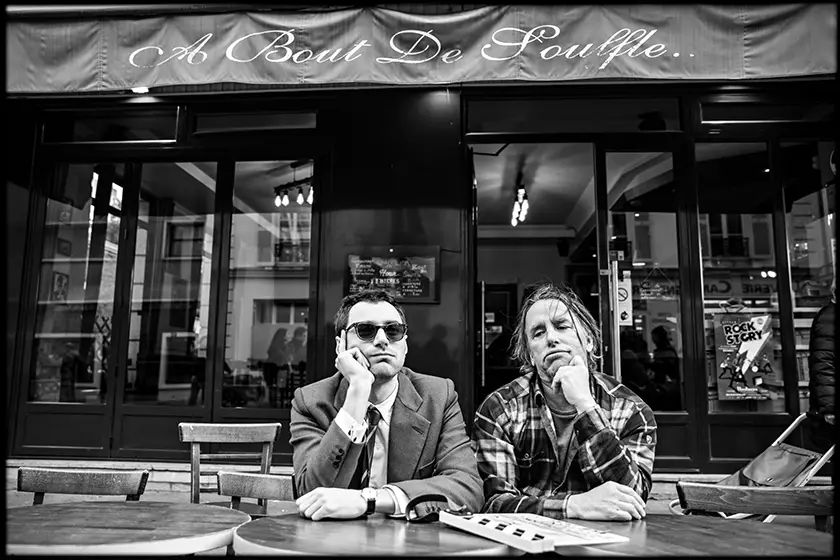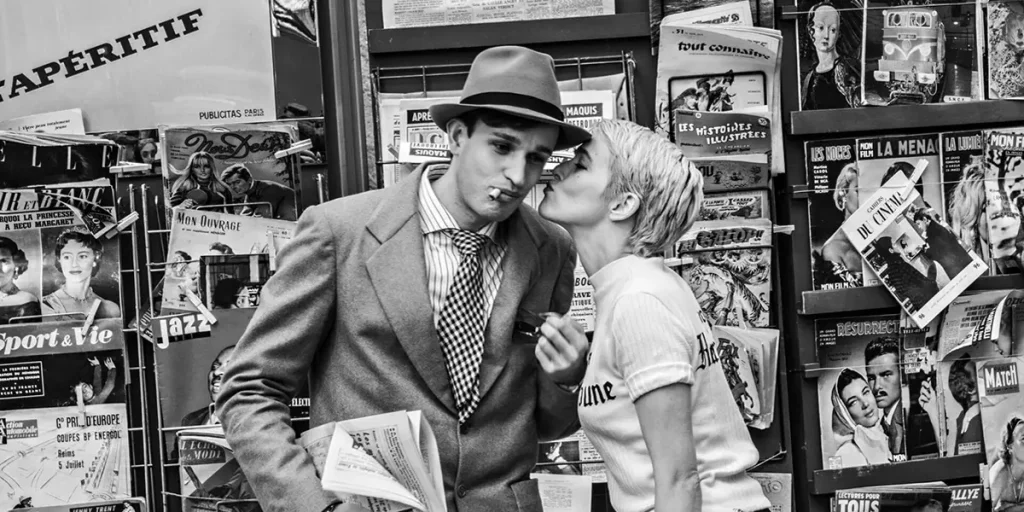Richard Linklater’s Nouvelle Vague is a joyous love letter to the work of Jean-Luc Godard, the French New Wave Movement and the art of filmmaking.
Director: Richard Linklater
Genre: Comedy, Drama
Run Time: 105′
Cannes Premiere of Nouvelle Vague: May 17-18, 2025
Theatrical Release: October 31, 2025
Netflix Release Date: November 14, 2025
The French New Wave movement blew the world of filmmaking wide open in the late 1950s and early 1960s. It challenged the traditional forms of storytelling in cinema by championing artistic narratives, experimental editing and personal visual styles. The movement was started by cinephiles and film critics who rejected and rebelled against mainstream filmmaking to create a freer, more expressive and more personal avenue for storytelling.
It serves as one of the most important movements in cinematic history, and if you have seen any of Richard Linklater’s work, its influence is clear in each and every one of his films. So much so that when Nouvelle Vague was announced, the connection between Linklater, Godard and the French New Wave seemed beyond obvious. Nouvelle Vague serves as a love letter to the movement, the concept of artistic expression and above all else, the joy of filmmaking.
Nouvelle Vague opens up on 1959 Paris at the pre-Cannes screening of François Truffaut’s (Adrien Rouyard) debut film The 400 Blows. Sitting in the screening are Truffaut’s good friends Jean-Luc Godard (Guillaume Marbeck), Claude Chabrol (Antoine Besson) and Suzanne Schiffman (Jodie Ruth-Forest). Out of the quartet, who have all written for the acclaimed French film magazine Cahiers du Cinéma, Godard is the only one who has yet to make his own film, despite his strong desire to do so.
Truffaut’s Cannes premiere impassions Godard to finally make his own film, bringing in Georges de Beauregard (Bruno Dreyfürst) as its begrudging producer. Godard sets his eyes on film star Jean Seberg (Zoey Deutch, of Everybody Wants Some) to star as an American student and aspiring journalist in Paris and newcomer Jean-Paul Belmondo (Aubry Dullin) as a fugitive criminal.
Godard hires Raoul Coutard (Matthieu Penchinat) as the camera operator in charge of shooting with the highly unusual camera choice, the Eclair Cameflex. The camera was light and able to move freely with the actors, but lacked the ability to synchronize sound, forcing the production to have to dub over the dialogue in post-production for every scene of the film.
Beauregard begins to push back on Godard for his highly unorthodox methods and demands to see the plans for the rest of the filming. This proves difficult, as Godard refuses to even commit to having a solid script. Every morning, he goes to a café and writes the day’s scenes, but also allows the actors to improvise freely.
His eccentric style and seemingly laissez-faire attitude towards the making of the film convince everyone involved that the project is going to be a complete and utter disaster. However, despite everyone’s mounting concerns, Godard is steadfast in his vision and confident in the work being done.
Nouvelle Vague is a film that exudes a palpable passion for the art of filmmaking. It honors the unorthodox methods and creative ideations that filmmakers must take to make something truly singular. It emboldens the ambitious and celebrates the experimental, serving as a perfect tribute to a generation of rebels disrupting the film industry.
Linklater’s vision transports his audience into 1959 Paris, where anything seems possible and everyone is taking risks. It grounds Jean-Luc Godard in a way you might not expect, given the massive iconology that precedes him. Godard is presented as hungry, determined and completely self-assured despite his actions leading everyone involved in the production to believe he is truly insane.
Guillaume Marbeck’s performance as Godard is generational. He perfectly encapsulates the charm, wit and ease of this titan of the film industry in a way that makes him feel tangible. Similarly, Zoey Deutch and Aubry Dullin play their roles with such uncanny accuracy and, true to Linklater’s style, effortless chemistry.

If your major trepidation about this film is that you think it is Linklater’s best attempt at imitating Godard, you can rest assured that he attempts no such thing. Nouvelle Vague makes no attempt to copy Godard’s style, but rather emulates the essence of his creative process to show the true joy in film creation.
Nouvelle Vague is a love letter to the creatives who dare to take risks. It aims to immortalize the process of creation and show that the greatest ideas will always be plagued by doubt before they are able to fully flourish. And above all else, it is a message that even the greats have to start somewhere.
Nouvelle Vague (2025): Movie Plot & Recap
Synopsis:
A reimagining of the production behind Jean-Luc Godard’s debut masterpiece Breathless.
Pros:
- Guillaume Marbeck’s performance as Jean-Luc Godard is one of the most spot-on portrayals you will ever witness in film. He perfectly encapsulates the wit, ease and charm of Godard, making his performance truly uncanny.
- The film has such a light, airy nature that captures the utter essence of both the joy of filmmaking and the spirit of the French New Wave
Cons:
- None to name.
Richard Linklater’s Nouvelle Vague premiered at the Cannes Film Festival on May 17-18, 2025. The film was released in U.S. theaters on October 31, 2025 and is now available to stream on Netflix.

